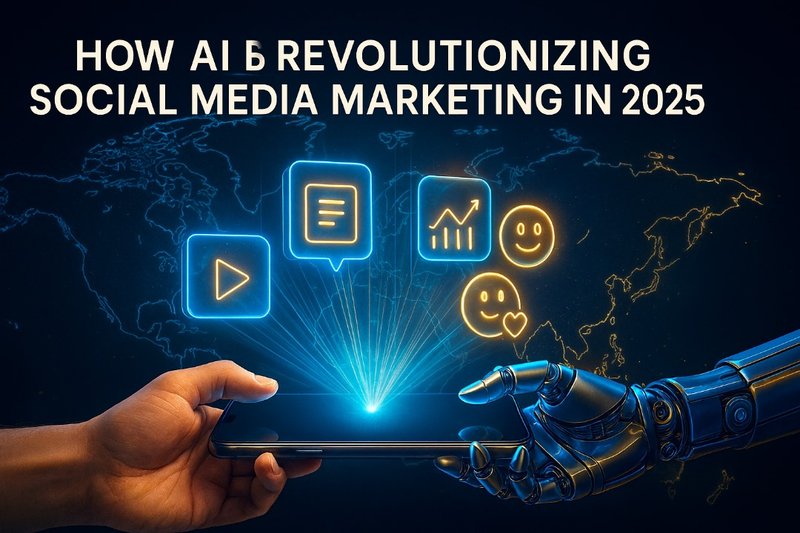How AI is changing social media marketing has significantly transformed the way we engage with audiences online. With over a billion active users, Instagram alone offers brands unprecedented reach across diverse demographics . In fact, AI adoption is accelerating among marketing professionals, with many reporting they now use AI-powered digital tools in their daily workflows and "couldn't live without AI" . According to recent data, the AI content marketing market has experienced explosive growth, jumping from $2.55 billion in 2023 to $3.20 billion in 2024—a remarkable 25.3% compound annual growth rate . This rapid expansion reflects how AI in digital marketing is no longer just a buzzword but a fundamental shift in how we create, optimize, and distribute content. Furthermore, AI is revolutionizing social media content creation across all platforms, making it more efficient, personalized, and effective than ever before . In this article, we'll explore what is AI on social media really doing to transform marketing strategies, examine whether social media platforms use AI in ways that benefit marketers, and provide eight practical, real-world examples of how AI is changing digital marketing landscapes in 2025. How AI is being used in social media marketing today Social media managers are discovering that AI tools have become essential partners in their day-to-day operations. Unlike traditional approaches that demanded hours of manual work, AI now handles many time-consuming tasks with remarkable precision. AI-generated captions and hashtags Gone are the days of staring at a blank screen trying to craft the perfect caption. AI caption generators now produce engaging text that matches your brand voice in seconds. These tools analyze vast datasets to understand what resonates with audiences across different platforms. For instance, ChatGPT can create captions complete with relevant hashtags and on-brand emojis in under a minute [1]. Hootsuite's OwlyGPT stands out by writing posts informed by real-time social media trends through Talkwalker, the leading social listening technology [2]. Additionally, these tools understand platform-specific requirements— recommending 138-150 characters for Instagram captions versus just 25 words for LinkedIn updates [2]. Automated post scheduling and optimization AI algorithms constantly monitor user activity patterns to identify peak engagement times, automatically scheduling your content when your audience is most receptive [1]. This intelligent scheduling means your posts receive maximum visibility without requiring constant manual adjustment. Content calendars also benefit from AI management, as these systems ensure posts are evenly distributed and aligned with campaign objectives [1]. Some advanced tools even offer conditional posting—automatically deploying follow-up content based on engagement metrics from previous posts [3]. AI-powered image and video creation Visual content creation has been revolutionized through AI tools that can generate professional-quality assets with minimal input. AI streamlines editing by automating tasks like background removal, image enhancement, and video assembly [4]. Video creation tools have become particularly sophisticated, with apps that can transform a single prompt into complete videos—handling everything from script generation to footage selection, voiceover addition, and transition placement [5]. Moreover, AI can automatically fix image issues and validate video specifications across platforms, ensuring compliance with different format requirements [6]. The efficiency gains are substantial—some businesses report up to 42% higher engagement with AI-optimized content and 15.2x faster community growth after implementing these tools [6]. 8 Real Examples of AI in Social Media Marketing Let's explore eight powerful AI tools presently reshaping how brands connect with audiences across social platforms. 1. ChatGPT for writing Instagram captions Creating scroll-stopping Instagram captions becomes effortless with ChatGPT. This AI assistant generates engaging, brand-aligned text based on simple prompts about your content type and desired tone. Social media managers report significant time savings, as ChatGPT produces multiple caption options complete with relevant hashtags in seconds rather than hours of brainstorming [7]. 2. Canva Magic Studio for visual content Canva's Magic Studio transforms how marketers create visual content through AI-powered tools. Magic Design generates custom, on-brand designs from text descriptions, while Magic Switch instantly reformats content for different platforms. Additionally, Magic Media converts text prompts into professional photos, 3D images, or short videos with a single click [8]. This suite of tools helps maintain brand consistency while freeing designers to focus on strategic creativity [9]. 3. Lately.ai for repurposing long-form content Lately.ai specializes in content atomization - automatically transforming videos, podcasts, and blogs into dozens of pretested social media posts. The platform's AI analyzes your past performance data to identify which words and phrases resonate best with your audience, consequently creating a customized writing model unique to your brand [10]. Some brands using this approach have seen engagement increase by over 100% [11]. 4. Hootsuite OwlyWriter for trending post ideas Hootsuite's OwlyWriter AI identifies real-time trending topics, then generates relevant post ideas that capitalize on these conversations before competitors. The tool adapts to your brand voice by analyzing your past content and bio information, thereafter creating posts optimized for each specific platform [12]. With up to six trending topics displayed from the past 24 hours, marketers can quickly join relevant conversations [13]. 5. Jasper for ad copy and product descriptions Jasper excels at producing conversion-focused copy for social advertising. The platform generates compelling ad copy for Facebook, Instagram, LinkedIn, and other platforms, along with product descriptions that drive sales. Users typically cut their copywriting process in half while maintaining consistent brand voice across campaigns [14]. Jasper's Brand Voice feature learns your style by analyzing your existing content, making all generated text sound authentically like your brand [15]. 6. Synthesia for AI-generated video content Synthesia creates professional video content without cameras, actors, or studios. The platform transforms text scripts into polished videos featuring AI avatars and voiceovers in 140+ languages [16]. Companies like Heineken have used Synthesia to train 70,000 employees through AI-generated videos, reducing traditional video production time by up to 90% [17]. 7. Surfer SEO for optimizing social posts Surfer SEO helps marketers create social content that performs well on search engines. While traditionally focused on blog optimization, its integration with content creation tools like Jasper allows for SEO-optimized social posts that extend content reach beyond platform algorithms [18]. 8. Meta's Advantage+ for AI-driven ad targeting Meta's Advantage+ suite harnesses AI to optimize ad targeting and performance. Advertisers using Advantage+ sales campaigns see 9% improved cost per action, while those using Advantage+ leads campaigns experience 10% lower cost per qualified lead [19]. The system automatically applies AI across audience selection, placement, and budget optimization to find people most likely to engage with your content [20]. What makes AI so effective in digital marketing The extraordinary effectiveness of AI in digital marketing stems from several core capabilities that fundamentally alter how brands connect with audiences. Faster content production Routine tasks like writing copy, mining consumer data, and creating visuals that once took hours can now be done in minutes [21]. AI automates critical marketing decisions and streamlines workflows, allowing teams to produce highquality content at unprecedented speeds [2]. Content creation tools can generate articles, blog posts, and social media posts in seconds, dramatically cutting production time [22]. This efficiency enables businesses to maintain consistent output without sacrificing quality. Hyper-personalization at scale AI analyzes vast amounts of customer data to deliver highly tailored experiences based on individual behavior and preferences [23]. Instead of relying on broad segmentation, AI creates unique customer profiles that learn and adapt over time [24]. This level of customization increases customer satisfaction—indeed, 71% of consumers now expect personalized content [23]. Companies implementing hyper-personalization see reduced acquisition costs by up to 50% and increased marketing ROI by 10-30% [23]. Real-time performance tracking AI-enhanced dashboards help marketers link their efforts to specific tactics, providing actionable insights from campaign data in near real-time [2]. This instant feedback allows for immediate adjustments based on up-to-the-minute behavior, ensuring businesses can capitalize on opportunities as they emerge [21]. Data-driven decision making By processing millions of terabytes of data daily, AI enables businesses to make decisions that more closely align with goals and objectives [25]. This approach reduces uncertainty and increases confidence in strategic planning [25]. Furthermore, predictive analytics allow businesses to anticipate trends and take preemptive actions [25]. Challenges and ethical concerns to watch for Despite the impressive capabilities of AI in social media marketing, several challenges and ethical concerns require careful attention from marketers embracing these technologies. Loss of human creativity and originality Although AI tools enhance productivity, overreliance risks a concerning loss of authenticity in marketing campaigns. The human touch that creates emotional connections with audiences cannot be fully replicated by algorithms [26]. Creative professionals worry that AI-generated content often produces clichés and lacks the innovative thinking that comes from breaking established patterns [27]. Bias in AI-generated content AI systems learn from existing data, meaning they can inherit and amplify societal prejudices. Studies show bias can affect between 3.4% to 38.6% of "facts" used by AI systems, depending on the database [6]. These biases may lead to unfair targeting, exclusionary marketing strategies, and even discriminatory pricing [6]. Transparency and disclosure issues Approximately 75% of businesses believe lack of transparency could increase customer churn [28]. The "Sports Illustrated" scandal, where AI-generated content was published without disclosure, demonstrates how transparency failures damage trust [21]. Ethical AI usage demands clear communication about how consumer data is collected and utilized. Job displacement in creative roles Entry-level creative positions face significant disruption from AI tools. About 30% of media jobs could be automated by 2035 [29]. Industry experts worry about nurturing new talent when traditional entry points disappear: "How do we nurture new talent if entry-level tasks become automated?" [21]. Conclusion AI has undoubtedly reshaped social media marketing as we enter 2025, bringing both remarkable opportunities and significant challenges. Throughout this article, we've seen how AI tools now handle tasks that once consumed hours of human effort—generating engaging captions, scheduling posts at optimal times, and creating professional-quality visuals with minimal input. The eight real-world examples demonstrate AI's practical applications across different marketing functions. ChatGPT streamlines caption writing while Canva's Magic Studio transforms visual content creation. Similarly, tools like Lately.ai and Hootsuite's OwlyWriter make content repurposing and trend identification effortless. These technologies, along with Jasper, Synthesia, Surfer SEO, and Meta's Advantage+, collectively represent how AI enhances marketing efficiency across platforms. What makes these AI applications so powerful? First, they dramatically accelerate content production, turning hours of work into minutes. Additionally, they enable hyper-personalization at a scale previously impossible. Real-time performance tracking allows marketers to make immediate adjustments, while data-driven decision-making reduces uncertainty in strategic planning. Still, we must approach this AI revolution with caution. The potential loss of human creativity, inherent biases in AIgenerated content, transparency issues, and job displacement represent serious concerns that marketers must address. Finding the right balance between AI efficiency and human creativity remains essential. As we look ahead, AI will certainly continue transforming social media marketing. The most successful marketers won't be those who simply adopt every new AI tool, but rather those who thoughtfully integrate these technologies while preserving the human elements that create authentic connections with audiences. The future belongs to those who can harness AI as a powerful assistant while maintaining their unique creative vision and ethical standards.




Comments (0)
Leave a Comment
No comments yet. Be the first to comment!